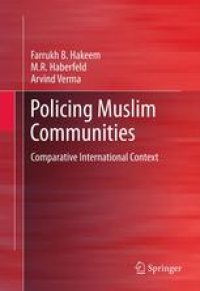
Ebook: Policing Muslim Communities: Comparative International Context
- Tags: Criminology & Criminal Justice, Private International Law International & Foreign Law Comparative Law
- Year: 2012
- Publisher: Springer-Verlag New York
- Edition: 1
- Language: English
- pdf
In the past two decades, Muslim countries across the globe have been faced with a crisis in governance. Starting with a summary of Islamic Law (Sharia) and its implications for law enforcement, this book will highlight the unique needs and challenges of law enforcement, and particularly policing, in these communities. It will provide a scholarly exposition of Sharia law and how it is compatible (or not) with policing in a modern context. The role and contribution of Sharia Law towards conceptualizing law enforcement in a modern context is certainly worth looking forward to, especially understanding its co-existence with civil law in countries with minority Muslim communities. Featuring case studies from throughout the Muslim world, this volume will highlight key qualities of Sharia law and Muslim culture that play a role in law enforcement, including: case processing, community policing, police administration, human rights, and the influence of globalization. Taking a comprehensive approach, this work provides a historical context for colonization events in Muslim countries and their influence on current law enforcement systems, as well as providing key insights into the particular norms that make up the bases for Muslim societies, and their unique needs. Looking into the future, it provides guidelines for how community policing can play a proactive role in law enforcement and crime prevention.
Recently the Islamic world is undergoing political crisis and social unrest, in no small measure due to conflict between traditionalism and modernism. At the center of this contention is the role of Sharia in Muslim society and the keeping of order. With this global discourse in mind, Policing Muslim Communities: Comparative International Context examines Sharia and its compatability with modern law enforcement. Issues and challenges regarding policing in Sharia-based, secular, and blended Islamic communities, communities under authoritarian and military control, and Muslim communities in non-Muslim countries are discussed in the current contexts of the human rights movements and global technologies. Balancing the perspectives of policing, by Muslims, with Muslims, and of Muslims, the book:
- Offers a concise summary of the normative foundations of Sharia and its implications for policing and law enforcement.
- Discusses in depth policing practices in Muslim-majority and mixed systems.
- Contrasts various approaches to policing, case processing, and training in today’s socio-political context.
- Traces the effects of historical events such as the socio-political change in Muslim societies on modern law enforcement.
- Provides insights into the preventive/proactive role of the community as a basis for an international model of policing.
- Features case studies from across the Muslim world.
Timely reading that fills a major knowledge void, Policing Muslim Communities: Comparative International Context will find a wide audience among criminologists, political scientists, religious scholars, scholars of Islam, and public policymakers.